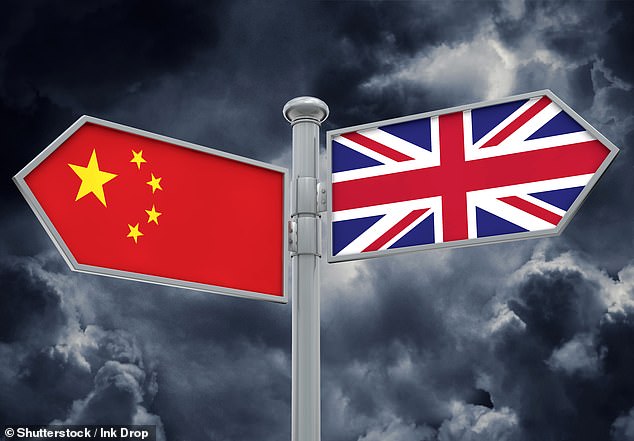Pockets of British industry vulnerable to Chinese predators looking to snap up bargains in coronavirus crisis
Pockets of British industry are vulnerable to Chinese predators looking to snap up bargains in the coronavirus crisis, according to a leading business group.
Paul Everitt, head of UK aerospace and defence body ADS, said cutting-edge manufacturers at risk of going bust could become easy targets for foreign buyers.
That could pose a threat to national security, if they are working on sensitive technologies, he added.
Moving in opposite directions: The Government is rushing to draw up tougher foreign takeover rules, amid growing concern about China’s efforts to dominate high-tech industries
His comments came as the Government rushes to draw up tougher foreign takeover rules, amid growing concern about China’s efforts to dominate high-tech industries.
Critics fear Beijing is buying so-called ‘dual use’ technologies from foreign companies and universities that appear harmless but can be weaponised to boost its military capabilities. And in a warning that will underline the concerns, Everitt said aerospace firms with close defence links could be left vulnerable in the months ahead as the industry is ravaged by the coronavirus and tumbling demand.
He said: ‘If you look at China, they want an aerospace industry and they already have taken stakes in UK businesses.
‘They might see this as an opportunity. But given there is a close relationship between aerospace and defence, that might make people slightly uncomfortable.’
Prime Minister Boris Johnson is said to be planning significant changes to UK takeovers rules, following years of criticism that the current regime is too lax. Relations with Beijing have turned sour over the communist regime’s brutal crackdown on Hong Kong and its early handling of the coronavirus crisis. Concerns are mounting over China’s involvement in a host of major projects in the UK – from the building of nuclear power stations to the rollout of 5G.
The changes to takeover rules would make it mandatory for British firms to report deals that could give rise to security risks, the Times reported, with directors who fail to do so threatened with hefty fines and potential jail sentences.
There will also be greater scrutiny of partnerships between foreign entities and British universities, which are feared to have given scientists with links to China’s military access to vast amounts of sensitive research already.
Matthew Henderson, a former British diplomat and Asia expert based at the Henry Jackson Society think-tank, said: ‘You have to recognise the importance of continued engagement with China but we must do so on pragmatic terms that make it plain that there are red lines we cannot cross. China has been using these technologies in ways that are often harmful to the continued security and stability of the world.’
The row over whether Huawei should be allowed to have a role in developing Britain’s 5G networks has made Chinese investment a controversial topic, with Beijing reportedly threatening to pull investment in several UK power plants over the row.
The Chinese ambassador, Liu Xiaoming, is said to have described the issue as ‘a litmus test of whether Britain is a true and faithful partner of China’.
